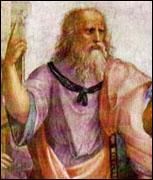
Plato (428-348 B.C.) |
Plato (428 B.C.-348 B.C.)
Odysseus Chooses His Next Life
Edited by Peter Y. Chou |
|
"The Myth of Er" from Plato's Republic, Book X (conclusion) This is the tale of a warrior, Er, the son of Armenius, by race a Pamphylian. He once upon a time was slain in battle, and when the corpses were taken up on the tenth day already decayed, was found intact, and having been brought home, at the moment of his funeral, on the twelfth day as he lay upon the pyre, revived, and after coming to life related what, he said, he had seen in the world beyond. He said that when his soul went forth from his body he journeyed with a great company and that they came to a mysterious region where there were two openings side by side in the earth, and judges were sitting between these, and that after every judgment they bade the righteous journey to the right and upward through the heaven with tokens attached to them in front of the judgment passed upon them, and the unjust to take the road to the left and downward, they too wearing behind signs of all that had befallen them, and that when he himself drew near they told him that he must be the messenger to mankind to tell them of that other world, and they charged him to give ear and to observe everything in the place... For he said that it was a sight worth seeing to observe how the several souls selected their lives. He said it was a strange, pitful, and ridiculous spectacle, as the choice was determined for the most part by the habits of their former lives. He saw the soul that had been Orpheus', he said, selecting the life of a swan, because from hatred of the tribe of women, owing to his death at their hands, it was unwilling to be conceived and born of a woman. He saw the soul of Thamyras choosing the live of a nightingale, and he saw a swan changing the choice of the life of man, and similarly other musical animals. The soul of Ajax, the son of Telamon, which, because it remembered the adjudication of the arms of Achilles, was unwilling to become a man. The next, the soul of Agamemnon, likewise from hatred of the human race because of its sufferings, substituted the life of an eagle. Drawing one of the middle lots of the soul of Atalanta caught sight of the great honors attached to an athlete's life and culd not pass them by but snatched at them. After her, he said, he saw the soul of Epeus, the son of Panopeus, entering into the nature f an arts and crafts woman. Far off in the rear he saw the soul of the buffoon Thersites clothing itself in the body of an ape. And it fell out that the soul of Odysseus drew the last lot of all and came to make its choice, and, from memory of its former toils having flung away ambition, went about for a long time in quest of the life of an ordinary citizen who minded his own business, and with difficulty found it lying in some corner disregarded by the others, and upon seeing it said that it would have done the same had it drawn the first lot, and chose it gladly... After the souls had chosen their lives in the order of their lots, they were led to the daughters of Necessity, the Three Fates— Lachesis, Clotho, and Atropos, whose spindle wove each their web of destiny. Then they journeyed to the Plain of Oblivion and drank at the River of Forgetfulness. And after they had fallen asleep and it was the middle of the night, there was a sound of thunder and a quaking of the earth, and they were suddenly wafted thence, one this way, one that, upward to their birth like shooting stars. Er himself, he said, was not allowed to drink of the water, yet how and in what way he returned to the body he said he did not know, but suddenly recovering his sight he saw himself at dawn lying on the funeral pyre. And so, Glaucon, the tale was saved, as the saying is, and was not lost. And it will save us if we believe it, and we shall safely cross the River of Lethe, and keep our soul unspotted from the world. But if we are guided by me we shall believe that the soul is immortal and capable of enduring all extremes of good and evil, and so we shall hold ever to the upward way and pursue righteousness with wisdom always and ever, that we may be dear to ourselves and to the gods both during our sojourn here and when we receive our reward, as the victors in the games go about to gather in theirs. And thus both here and in that journey of a thousand years, whereof I have told you, we shall fare well.
Plato (428 B.C.-348 B.C.), |
![]()
| Top of Page
| Human Spirit Stories
| Singularity Resources
| Wisdom Stories
| Peace |
| Stanford Lectures
| Art & Spirit
| Books
| Enlightenment
| Poetry
| A-Z Portals
| Home |
![]()
| © Peter Y. Chou, WisdomPortal.com P.O. Box 390707, Mountain View, CA 94039 email: peter@wisdomportal.com (8-25-2003) |
 |